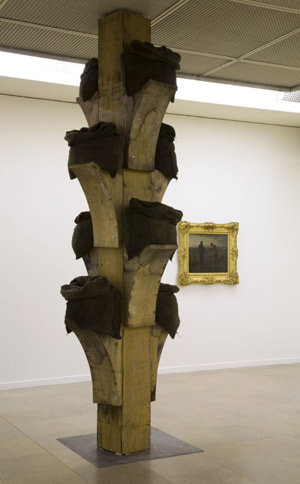Correspondances
dal 15/10/2007 al 5/1/2008
Segnalato da
15/10/2007
Correspondances
Musee d'Orsay, Paris
Emmanuel Saulnier / Odilon Redon - Jannis Kounellis / Jean-François Millet

Emmanuel Saulnier / Odilon Redon - Jannis Kounellis / Jean-François Millet
curated by Serge Lemoine assisted by Olivier Gabet
In “Correspondances” contemporary artists put their own creation in resonance with a work in the collection of the Musée d’Orsay. For this new series, Emmanuel Saulnier has chosen Odilon Redon and Jannis Kounellis measures himself with the famous Angelus by Jean-François Millet.
Emmanuel Saulnier / Odilon Redon
A French artist born in 1952, Emmanuel Saulnier never stopped reflecting on and revisiting two essential notions of his work: the presence of the object and movement. For Saulnier, the physical implication of work invites the use of all spaces, often those you would not expect, communal areas, public spaces or natural countryside. Subtle and poetic, this approach to art involves transparency, fragility and balance, reminding us that a work of art leads to a vision, a thought, by forming a space of metaphors. Through these curious preconceptions, Emmanuel Saulnier liberates himself and his work from the usual structures of artistic creation. His sculptures, in the paradox of the used materials, fragile (glass) or solid (stone), develop another relationship with the pedestal, the floor and the earth, echoing Brancusi. In a certain way, the strength of the vision and the reflections that form its base guarantees the work a pedestal of its own stability and longevity. Rather than a particular piece of work, Saulnier has chosen the figure of Odilon Redon, by installing his work Ben Irakim. Je suis loin (2003) in the very centre of the room dedicated to the artist, bathing this installation, where glass supports stone, in the elliptical light of pastels. For Saulnier, Odilon Redon offers another aspect to the notion of movement, as the romantics and impressionists have spoken of it, to go and to go far, new landscapes or exotic lands, proclaiming the imperious necessity to internalise this movement, making it thus more profound and intense.
Jannis Kounellis / Jean-François Millet
Born in Greece in 1936, Jannis Kounellis lives and works in Italy. A prominent figure in contemporary art since the late 1950s, Kounellis is, despite his claimed independence, linked to the Arte Povera movement, according to the term used by the critic Germano Celant in 1967. An attitude more than an artistic movement, Arte Povera promotes the idea of resistance to traditional social frameworks, in a revolutionary way, and arouses a critique of the present time by taking support on the constant reference to nature. When defining it, Celant insists on the analogy between art and guerrilla, with what it implies in reaction, mobility and precision: to discard the traditional materials and usual structures of art in order to react more quickly to the world, without being bound by the cultural economy. It is to this radical lack of resources, and not without resort to an evident stylishness, that the wealth of conceptual reflections displayed responds. This movement unites artists as varied as Giovanni Anselmo, Luciano Fabro, Mario Merz, Giulio Paolini and Pino Pascali. Fascinated by the relationship between nature and culture, Jannis Kounellis interrogates himself over the interactions between organic, mineral and animal materials (carbon, milk, stone, wood) and natural elements (air and fire), inventing his own poetic language. This language lends itself to the sacred and to mysterious, but also to the primate of feelings, never before assessed by such a title, but bought about by the immediacy of the work, its theatricality and its sensuality, fundamental things in an artist for whom the essential resides in the expansion of the “kingdom of senses” (Germano Celant)… Coming from a pictorial tradition which would connect Caravage to the cubists, Munch to De Chirico, and being far more than sculptural, Kounellis has chosen to correspond with Millet’s Angelus.
Image: Jannis Kounellis Without title, 2007
Musee d'Orsay
1, rue de la Legion d'Honneur - Paris
Open Daily from 9.30am to 6pm; Thursday 9.30am to 9.45pm.; Closed Mondays
admission: Full rate: euro 7.50; Concessions and Sundays: euro 5.50. From January 1st 2008 Full rate: euro 8



